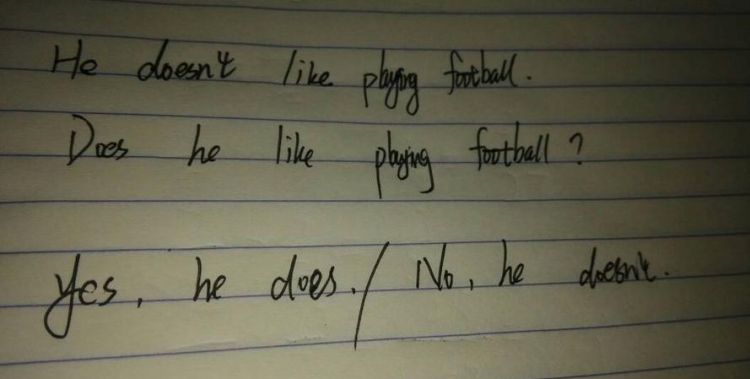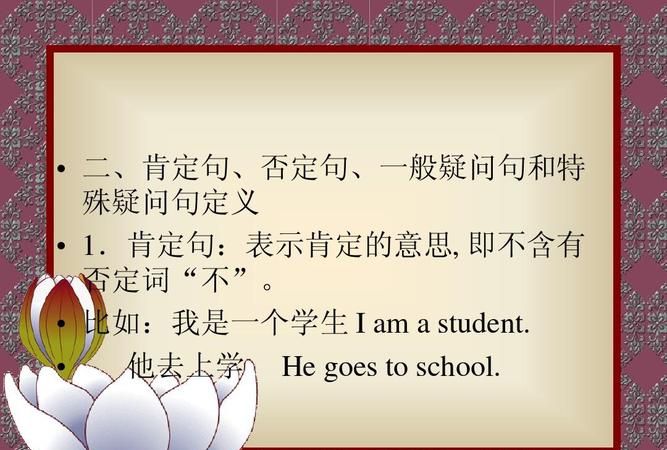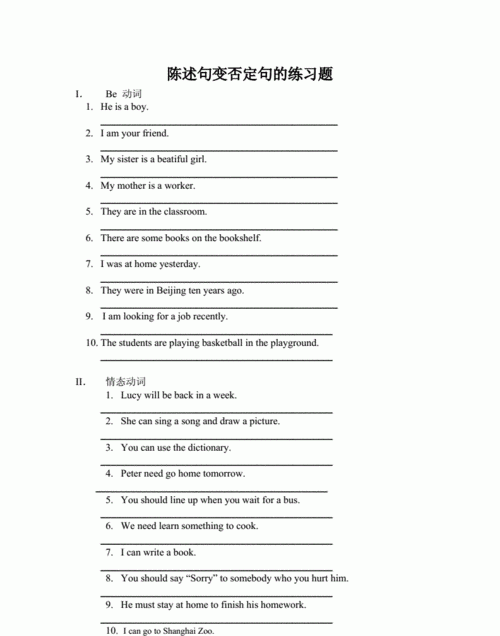本文目录
五年级英语肯定句变否定句
1.动词be的否定式
动词be根据不同的人称和时态可以有am,is,are,was,were等不同形式,可用作连系动词(表示“是”、“在”等)和助动词(用于构成进行时态和被动语态等),但不管何种情况,构成否定式时,一律在其后加not:
I’m old,but you’re young.我老了,但你还年轻.
→I’m not old,but you’re not young.我还不老,但你不年轻了.
He was reading and I was writing.他在读,我在写.
→He was not reading and I was not writing.他没有在读,我没有在写.
2.动词have的否定式
动词have根据不同的人称和时态可以有have,has,had等形式,可以用作实意动词和助动词,分以下情况讨论:
1.用作实意动词表示状态,如表示拥有、患病或用于have to表示“必须”等,在构成否定式时可以直接在其后加not,也可根据情况在其前使用don’t,doesn’t,didn’t:
He has a car.他有辆小汽车.
→He hasn’t a car./ He doesn’t have a car.他没有小汽车.
He had some dictionaries.他有一些词典.
→He hadn’t any dictionaries./ He didn’t have any dictionaries.他没有词典.
You have to go with him.你必须同他一起去.
→You haven’t to go with him./ You don’t have to go with him.你不必同他一起去.
【注】have to构成否定式时以在其前加don’t等较为常见.
2.用作实意动词表示动作,如表示“吃(=eat)”、“喝(=drink)”、“拿(=take)”、“收到(=receive)”、“度过(=spend)”等,构成否定式时不能直接在其后加not,而应根据情况在其前使用don’t,doesn’t,didn’t:
He had some cake for breakfast.他早餐吃了些蛋糕.
→He didn’t have any cake for breakfast.他早餐没有吃蛋糕.(不能用had not)
We had a good holiday.我们的假期过得很愉快.
→We didn’t have a good holiday.我们的假期过得不愉快.(不能用had not)
3.用作助动词构成完成时态,其否定式只能在其后加not:
I have read the book.我读这本书.
→I have not read the book.我还没读这本书.
He had left when I arrived.我到达时他已离开了.
→He hadn’t left when I arrived.我到达时他还没有离开.
3、情态动词的否定式
情态动词的否定式一般在其后加not构成:
I can finish the work in an hour.我能在1小时内完成这工作.
→I can’t finish the work in an hour.我不能在1小时内完成这工作.
You must go with us.你必须同我们一起去.
→You mustn’t go with us.你不能同我们一起去.
We should help them.我们应该帮助他们.
→We shouldn’t help them.我们不必帮助他们.
4、实意动词的否定式
一般实意动词的否定式,通常应根据不同时态和人称在实意动词之前加don’t,doesn’t,didn’t等:
He works in a bank.他在一家银行工作.
→He doesn’t work in a bank.他不是在银行工作.
We often hear from her.我们经常收到她的来信.
→We don’t often hear from her.我们不经常收到她的来信.
I met her at the station.我在车站见到了她.
→I didn’t meet her at the station.我在车站没见到她.

五年级英语关于否定句+not和no
否定句:there aren't any tall buildings.
no和not的用法区别no是形容词, 一般放在名词的前面。no=not any或not a; not是表示否定的副词。如:
I have no brothers =I haven’t anybrothers

英语否定句的句子有哪些
英语语法中否定句分为九种:
(1)一般否定句
I don't know this.否定句式
No news is good news. 否定词no
There is no person smoking here.

(2)特指否定
He went to his office, not to see him.
I am sorry for not coming on time.
I don't think/believe/suppose/feel/imagine you are right.
(3)部分否定
All the answers are not right
All is not gold that glitters.
I don't know all of them.
I can't see everybody/everything.
Both of them are not right.
(4)全体否定
None of my friends smoke.
I can see nothing/nobody.
Neither of them is right.
Nothing can be so simple as this.
(5) 延续否定
You didn't see him, neither/nor did I.
You don't know, I don't know either.
He doesn't know English, let alone/to say nothing of/not to speak of (更不用说) French.
(6) 半否定句
We seldom/hardly/scarcely/barely hear such fine singing.
I know little English. I saw few people.
(7) 双重否定
You can't make something out of nothing.
What's done cannot be undone.
There is no sweet without sweat.
No gain without pains.
I can't help /keep/ laughing whenever I hear it.
No man is so old but (that) he can learn.
(8)排除否定
Everyone is ready except you.
He did nothing but play.
But for your help, I couldn't do it.
(9)加强否定
I won't do it at all.
I can't see it any more.
He is no longer a boy.
在英语中什么样的句子被称为否定句并举例说明
将be动词或是助动词变成否定形式,比如is的否定就是is not,助动词do的否定就是don‘t
例如:我是一名学生:i am a student.这句话的否定形式就是 i am not a student.即我不是一名学生。
我想吃水果:i want to eat fruit.这句话的否定形式就是 i don't want to eat fruit.即我不想吃水果。

以上就是关于否定句英语五年级 ,五年级英语肯定句变否定句的全部内容,以及否定句英语五年级 的相关内容,希望能够帮到您。

